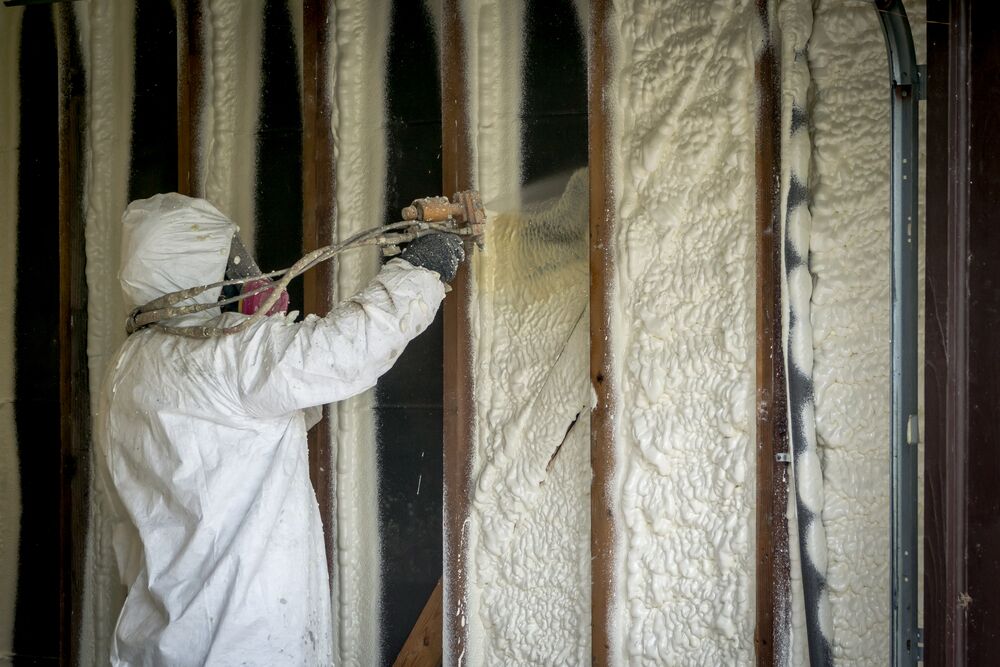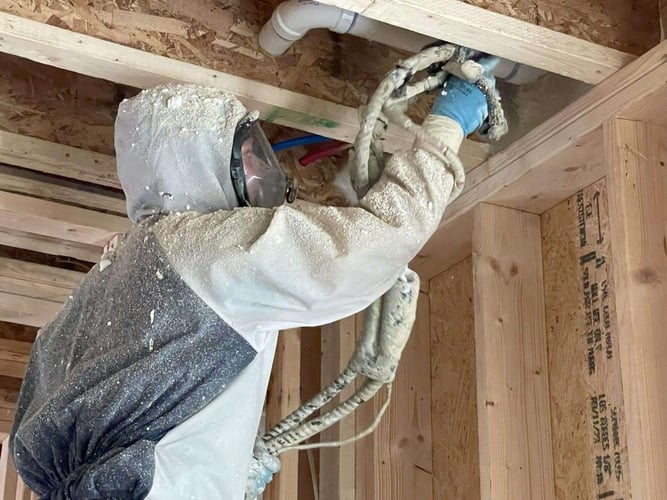Comparing Spray Foam to Conventional Insulation: Which Is Better?
Comparing Spray Foam to Conventional Insulation: Which Is Better?
Blog Article
Top Reasons to Choose Spray Foam for Your Following Insulation Task
When thinking about insulation options for your following project, spray foam sticks out as a result of its excellent performance characteristics and effectiveness advantages. Its remarkable R-value not only improves thermal resistance however also contributes to significant energy financial savings in time. The product's capability to develop an airtight seal efficiently lowers air seepage and lessens the risk of moisture-related issues, such as mold growth. As you consider your options, exploring the versatile applications and long-term benefits of spray foam might expose compelling reasons to incorporate it right into your insulation approach.
Superior Insulation Performance

The high R-value of spray foam, which determines its thermal resistance, is one more vital advantage. Closed-cell spray foam, for example, can attain an R-value of as much as 6.5 per inch, dramatically outmatching fiberglass batts and cellulose. Spray foam insulation develops a closed seal, which lessens thermal linking and reduces the potential for mold and mildew development due to moisture build-up.

Power Efficiency Conveniences
The energy performance advantages of spray foam insulation are considerable, more enhancing its charm as a top choice for constructing insulation. Spray foam expands upon application, developing a closed seal that minimizes air leaks, which is a common source of power loss in conventional insulation products.
Additionally, spray foam insulation flaunts a high R-value per inch, which means it provides a lot more thermal resistance in less space compared to alternatives like fiberglass or cellulose (Spray Foam). This performance not only adds to immediate power financial savings but also advertises long-term sustainability by decreasing the general power consumption of a structure
Moreover, the execution of spray foam can qualify house owners for power performance incentives and tax credit scores, adding financial advantages to its energy-saving capacities. In a period where power conservation is vital, selecting spray foam insulation not just improves comfort but additionally aligns with environmentally responsible techniques, making it a sensible option for both residential and industrial jobs.
Dampness and Mold Resistance
Given its special structure and application approach, spray foam insulation uses remarkable dampness and mold resistance, making it an excellent choice for different settings. The closed-cell structure of spray foam produces a strong barrier that properly seals prospective moisture ingress, consequently reducing the chance of mold growth. Unlike conventional insulation products, which can soak up water and offer a breeding ground for mold and mildew, spray foam remains unsusceptible moisture, improving the overall health and wellness of the indoor environment.
In addition, the application process of spray foam entails broadening and filling voids and fractures, guaranteeing a limited seal that decreases air leaks. This characteristic not just enhances power efficiency but additionally helps control humidity degrees within the room. Appropriate moisture control is important for preventing mold and mildew, making spray foam insulation specifically advantageous in areas susceptible to moisture, such as cellars and creep spaces.
Along with its moisture-resistant buildings, spray foam is also inherently resistant to mold and mildew development. This characteristic makes sure that buildings and homes remain risk-free and healthy over time, providing satisfaction to house owners and structure managers alike.
Long-Term Expense Cost Savings
Investing in spray foam insulation returns substantial long-lasting expense savings, mainly through enhanced power performance. Unlike standard insulation materials, spray foam develops a closed seal that reduces air leak. This reduction in drafts leads to reduce visit this web-site cooling and heating costs, as HVAC systems do not have to function as hard to keep comfy indoor temperatures.
In addition, the remarkable insulating residential or commercial properties of spray foam mean that homes stay consistently comfy year-round, decreasing reliance on energy-consuming appliances. Gradually, these savings can build up, leading to a recognizable decrease in utility expenses.
In addition, spray foam insulation adds to the long life of your home's structure by preventing moisture build-up and mold growth, which can cause expensive fixings. With its durability and resistance to settling, review spray foam maintains its effectiveness throughout the years, guaranteeing that the preliminary investment continues to pay off.
Basically, choosing spray foam insulation not only enhances your home's power performance yet likewise equates into significant long-term economic advantages, making it a smart investment for property owners wanting to reduce expenses while boosting comfort and sustainability.
Versatile Application Options
Numerous application alternatives make spray foam insulation an extremely flexible choice for a selection of structure projects (Spray Foam). This flexibility permits it to be successfully utilized in household, business, and industrial setups, satisfying diverse insulation demands
Spray foam can be applied in attic rooms, wall surfaces, crawl rooms, and even roof coverings, supplying smooth insurance coverage that gets rid of gaps and spaces where air leaks generally happen. Its capacity to broaden upon application ensures a tight seal, which is important for power efficiency and wetness control.
Moreover, spray foam insulation is offered in different formulas, consisting of open-cell and closed-cell types, permitting tailored services based upon specific job requirements. Open-cell foam is lighter and much better matched for soundproofing, while Our site closed-cell foam offers remarkable insulation and architectural integrity, making it suitable for areas subjected to dampness.
In enhancement, spray foam can be applied in hard-to-reach areas, boosting its viability for retrofitting existing structures. With the ability to stick to numerous substrates, including concrete, steel, and timber, spray foam insulation stands out as a flexible choice that fulfills the needs of modern-day structure practices.
Verdict
In conclusion, spray foam insulation arises as a superior choice for insulation tasks due to its extraordinary thermal resistance, power efficiency, and capability to develop airtight seals that stop dampness and mold development. Picking spray foam insulation guarantees a detailed solution that satisfies the needs of modern building and power efficiency criteria.
When it comes to achieving ideal power efficiency in property and business structures, spray foam insulation stands out for its premium insulation performance.The energy effectiveness benefits of spray foam insulation are considerable, more boosting its allure as a leading selection for constructing insulation.Spending in spray foam insulation yields significant long-term expense financial savings, mostly via boosted power performance.In verdict, spray foam insulation arises as a superior option for insulation jobs due to its outstanding thermal resistance, power performance, and capacity to develop impermeable seals that stop wetness and mold growth. Selecting spray foam insulation ensures a comprehensive remedy that fulfills the demands of contemporary construction and power efficiency criteria.
Report this page